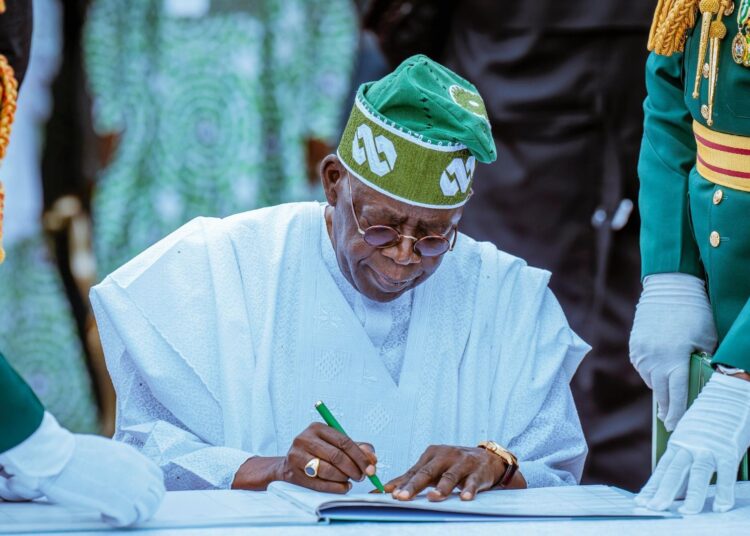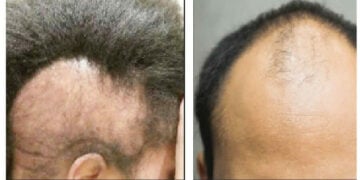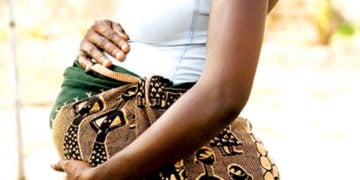President Bola Tinubu has once again shown that he isn’t afraid to shake the table. In a move that took even insiders by surprise, he announced sweeping changes in the hierarchy of the Armed Forces, replacing all the Service Chiefs, except the Chief of Defence Intelligence.
A day before, he swore in Professor Joash Amupitan as Chairman of the Independent National Electoral Commission (INEC). Two major appointments in two sensitive sectors—security and elections. Both moves have drawn applause, cautious optimism, and the usual dose of political speculation.
At face value, there’s nothing unusual about this. Every President, sooner or later, rearranges his security team. The same goes for INEC leadership; tenure expires, and a new hand comes in. But in Nigeria, timing always tells a story. And Tinubu’s timing, coming midway into his second year, suggests more than routine housekeeping.
Let’s start with the military reshuffle. General Olufemi Oluyede now takes over as Chief of Defence Staff, replacing General Christopher Musa. Major-General W. Shaibu becomes Chief of Army Staff, Air Vice Marshal S. K. Aneke heads the Air Force, Rear Admiral I. Abbas takes charge of the Navy, while Major-General E. A. P. Undiendeye retains his seat as Chief of Defence Intelligence.
On paper, it’s a solid line-up. The question is what difference they can make in the field. Because Nigerians are long past the point of being impressed by uniforms and parades. The last set of Service Chiefs also arrived with fanfare. We were told they would bring a new strategy, new energy, new synergy—those were the buzzwords. Yet, the headlines remained the same: bandits attacking villages, terrorists ambushing soldiers, kidnapping on highways, and oil theft in the creeks.
The truth is, reshuffling the deck only matters if the players change the game.
Tinubu said the appointments were part of efforts to strengthen the national security architecture. That phrase has become almost ceremonial. Every President since 1999 has promised to strengthen that same architecture, yet it keeps collapsing under pressure. If the walls keep falling, maybe it’s not the architecture; maybe it’s the architects.
What Nigeria’s security establishment needs isn’t another round of title changes—it’s accountability. The country spends over N2 trillion annually on defence and security. In 2023, the defence budget was N1.2 trillion; this year, it’s even higher. Yet, the average Nigerian still sleeps with one eye open. Communities in Zamfara, Benue, and Plateau still hold vigils out of fear, not piety.
To be fair, the job isn’t easy. The Armed Forces are stretched thin, fighting on too many fronts—terrorism in the North-East, banditry in the North-West/North-Central, and oil theft in the South-South. Add internal politics, poor intelligence coordination, and the ever-present issue of funding leakages, and you have a perfect storm.
That’s why the new Chiefs must understand that the public doesn’t want motivational speeches. Nigerians want results—safer highways, fewer funerals, real deterrence. The military must also fix its image problem. Over the years, the line between gallantry and human rights violations has blurred. Restoring public confidence is as important as winning battles.
Tinubu’s decision to keep Major-General Undiendeye as Chief of Defence Intelligence might be a smart one. Continuity in intelligence helps maintain institutional memory, especially in counter-terrorism operations. But the President must demand better coordination between the service arms. The Army, Navy, and Air Force often operate like rival companies bidding for the same contract. The result is duplication, rivalry, and confusion.
Meanwhile, the appointment of Professor Joash Amupitan as INEC Chairman deserves its own attention. The Independent National Electoral Commission remains the most scrutinized institution in Nigeria after the Presidency itself. One flawed election can ignite chaos; one credible poll can restore faith. So, whoever sits in that chair carries a heavy burden.
Amupitan’s confirmation came after the Senate’s screening on October 16. By all accounts, he’s a man of learning and integrity. But we’ve heard that before. The system has a way of humbling saints. Ask his predecessors.
During the swearing-in, Tinubu charged him to uphold electoral integrity and strengthen democracy. Lofty words, but the real test will come when he faces pressure from the same politicians who cheered his appointment. Every INEC Chairman starts as an impartial referee; by the end of their tenure, half the country calls them biased. It’s a familiar script.
Elections in Nigeria have improved in logistics but not in trust. The last general elections showed that technology alone doesn’t guarantee credibility. The BVAS machines worked in some places and mysteriously failed in others. Collation centres became theatres of suspicion. What Nigerians want isn’t perfection; it’s consistency. One rule for everyone, from Lagos to Lafia.
Amupitan must also confront the elephant in the room—the influence of money. Campaign financing remains the biggest loophole in our democracy. The law caps spending, but enforcement is laughable. Candidates spend billions, yet INEC rarely sanctions anyone. Until the Commission gets serious about tracking campaign funds, elections will remain auctions.
Tinubu’s advice to the new INEC Chairman about fairness and transparency sounded presidential enough. But leadership is more than speeches. The President himself must demonstrate distance from the Commission. Nigerians are allergic to any hint that the umpire takes instructions from Aso Rock. The credibility of the next election cycle will depend on how insulated INEC remains from political interference.
Now, some people have argued that the President’s recent appointments signal a quiet consolidation of power. That may be reading too much into routine governance. Every leader prefers to work with people he trusts. The real issue isn’t whether Tinubu is placing loyalists; it’s whether they can deliver. Competence should trump loyalty. A loyal failure is still a failure.
There’s also the matter of optics. When a President reshuffles both the military and the electoral commission within weeks, it naturally fuels speculation. In Nigeria’s political dictionary, “reform” often shares a page with “strategy.” But maybe that’s unfair to this administration. After all, Tinubu has always been decisive with appointments. He moves fast, sometimes too fast for the bureaucracy to catch up.
Still, the appointments alone won’t fix the rot. Institutions, not individuals, determine stability. If we keep changing men without changing methods, we’ll stay trapped in the same loop—new faces, old outcomes.
Let’s not forget, these are two of the most sensitive institutions in any democracy: the military guarantees physical security, while the electoral body guarantees political legitimacy. When both are shaky, the entire system wobbles. Nigeria can survive bad politicians; it can’t survive a politicised military or a compromised election body.
The President’s media aide, Sunday Dare, described the military changes as “a routine exercise.” Maybe so. But Nigerians have seen enough “routine exercises” that yield zero impact. What we need now is operational transformation—clear performance metrics, regular briefings, and public accountability.
For INEC, the expectations are even higher. Local government elections across the country have become a national embarrassment—every ruling party wins all the seats. If Amupitan can’t influence the political culture at the grassroots, his reforms at the national level will be cosmetic. Electoral credibility must start from the bottom.
There’s also a generational angle. The average age of these new Service Chiefs hovers around the mid-50s. They are battle-tested officers who know the difference between civil authority and military adventure. At a time when coups are making a comeback across Africa—Niger, Gabon, Mali, Burkina Faso—Nigeria must not take its relative stability for granted.
Tinubu has a duty to remind the military that civilian supremacy is non-negotiable. Discipline must go both ways—the soldiers in the field and the politicians giving orders. The military must never again be tempted into political arbitration.
Security and democracy are two sides of the same coin. Without security, elections become rituals; without credible elections, the fight for security loses moral weight. That’s why Tinubu’s twin appointments matter. They sit at the intersection of safety and legitimacy. If both institutions perform, the government gains trust; if they fail, the cynicism deepens.
As always, the Nigerian public will judge not by communiqués but by experience. If the new Service Chiefs can bring down kidnapping numbers and restore calm in crisis-ridden zones, confidence will return. If INEC can conduct a credible off-season election without drama, hope will flicker again. Nigerians don’t demand miracles—only visible effort and fair play.
Tinubu’s presidency has entered the phase where excuses expire. These appointments are his full responsibility now. If the military falters, it’s his call. If INEC stumbles, it’s on his watch.
Every government is remembered for one defining remembrance. Obasanjo had telecom liberalisation, Umaru Yar’Adua had the Niger Delta amnesty, Goodluck Jonathan had electoral reform, Muhammadu Buhari had the anti-corruption crusade (however flawed). Tinubu still has time to find his signature policy. Strengthening institutions like the military and INEC could be it—if he resists the temptation to politicise them.
For now, Nigerians will wait and watch. We’ve seen too many promises dissolve into press statements. The President has picked his security team; the honeymoon is over. Results are the only applause that matters.
No doubt, leading Nigeria is like holding water with bare hands. But Tinubu asked for the job, and he got it. His new appointees have no honeymoon, no learning curve, and no excuses. The nation is tired of recycled rhetoric. What we need now are measurable outcomes.
The new Service Chiefs must earn their stars in the field, not in protocol photos. The new INEC Chairman must prove that democracy can work without manipulation. If both deliver, Tinubu’s legacy writes itself. If not, it becomes another footnote in our long story of missed opportunities.





